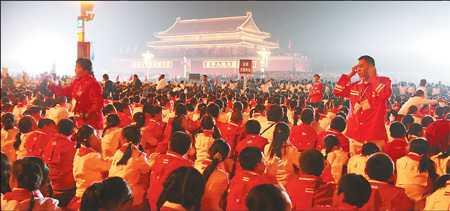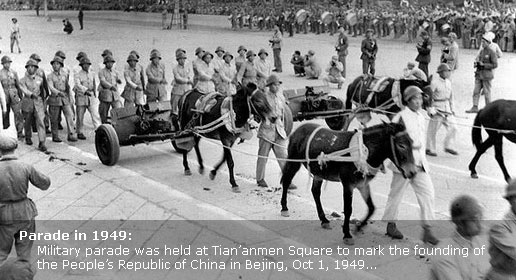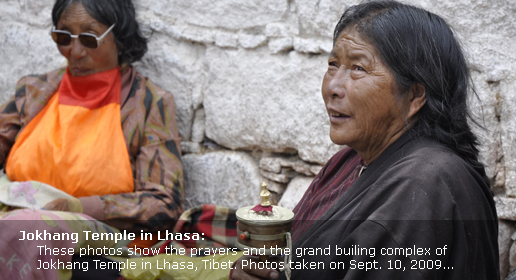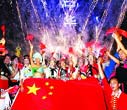Celebrations
Countdown to the National Day gala
By Li Xiang and Mei Jia (China Daily)
Updated: 2009-09-22 10:05
|
 Students attending a recent rehearsal for the National Day celebration wait for their turn in Tian'anmen Square. [China Daily] |
While today's school children may share the same enthusiasm for the parade as earlier generations, some things have changed, keeping pace with the nation's rapid growth in the recent past.
After the rehearsals around 4 am, Tian and her classmates are picked up by parents driving Volkswagens and Toyotas and are taken to 24-hour McDonalds outlets to grab a bite.
"But back in 1984 we all walked home after the rehearsal," says Li. "We looked more revolutionary (than these children). Our outfits and the flowers were less fancy than theirs."
Li and her family live near Jingshan Park, which is only a few blocks away from Tian'anmen Square. She says preparations for the parade have not affected them much, except for some roads being blocked for the rehearsals.
But the traffic restrictions imposed for the rehearsals have affected the business of nearby shops and restaurants in the area.
"My business has gone down by 30 percent since the first round of rehearsals on Aug 28," says Zhang Xueliang, owner of a small liquor and cigarette store in the Jingshan neighborhood. "It was worse when the streets were blocked because there was no traffic, tourists or foreigners."
For some, returning home from work also became a long odyssey that took many hours. Trains bypassed stations on the parade routes and no bus or taxi stopped for Wei Dong, a 37-year-old office worker in Beijing, forcing him to walk four hours to cover a distance that usually took 20 minutes. His wife had it worse, he says, as she had to spend the night in a hotel.
Despite the temporary inconvenience, many participants see the celebration, which will include 60 floats, as a spectacle that will rival last year's Beijing Olympic Opening Ceremony.
"The real celebration is going to be different from the rehearsal, especially when you know that tens of thousands of spectators, tourists and media from home and abroad will be watching us on that day," says Su Dongrui, an 18-year-old student from Peking University (PKU). The school's contingent of 3,600 students is the largest from a university.
"It is a celebration that really unites us," says Su. "I'm proud to be part of it and witness history in my lifetime."
She says that her seniors in PKU were involved in the Beijing Olympics last year and that inspired her to take part in the National Day parade.
She hopes the students can once again create an iconic moment like they did during the 1984 National Day parade, when they held a banner saying "Hello, Xiaoping", in a reference to China's "paramount leader" Deng Xiaoping.
Ding Weifeng, who was born in 1990 and studies in Beijing Language and Culture University (BLCU), shares Su's excitement about participating in the parade.
Right after his required military training in early July this year, Ding joined the drills for the parade. The sophomore-to-be soon realized that he would be sacrificing his first summer vacation in university.
But before the first rehearsal along Chang'an Avenue at the end of August, he had just a vague idea of what the drills would mean for himself.
Ding remembers feeling moved by how the avenue, which is familiar to all Chinese, had been decorated. And he was even more excited when he heard the name of BLCU as he marched through Tian'anmen Square.
It suddenly dawned on him that he would be contributing to showcasing the nation's pride in front of so many people from home and abroad.
"I felt so proud then because I felt part of the unity we had created through our unified performances," Ding says.













